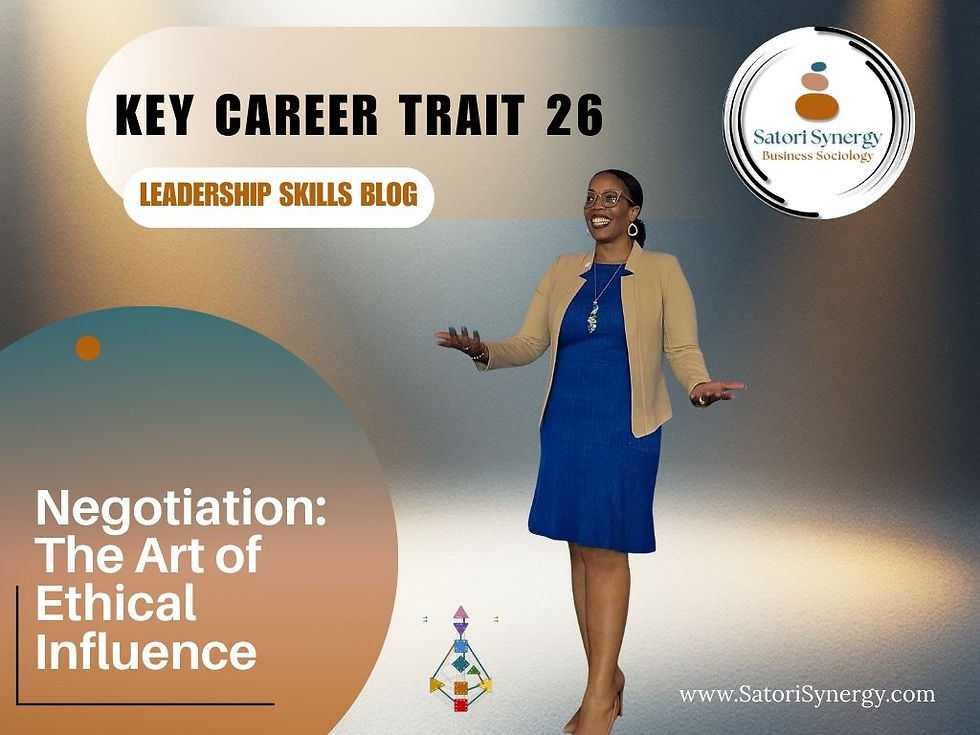Key Career Trait 24: THE THINKER
- Erica Hughey

- Apr 30
- 3 min read
Updated: Apr 30
You don't know what you don't know. And that's ok. These three question will help prevent you from hyper focusing on your never-ending thoughts.
What do I need to know?
What don't I need to know?
What is unknowable?
I want to encourage you to think about your thoughts. But not too much because you shouldn't believe everything you think, just like you can't blindly believe AI. You have to balance it with social awareness and emotional intelligence. You are the original supercomputer, ChatGPT is modeled after your brilliant mind! This the skill to take something that inspires you and turn it into a rational concept to be communicated to others.

If you are the Thinker in your department, your team depends on you to process the problems and you are happy to mentally circle around them and buffer, like a computer. You're the one who often hears, "Can you look at this for me? I can't figure it out.", for you to do your magic, think it over and sort it out. Be careful not to let it turn into ruminating and distract you from the task at hand. If so, go touch grass to discharge that energy... seriously.
With a Trait 24 activation in your Career Blueprint Chart, You bring the ability to analyze thoughts and process information in a way that opens up new perspectives. In your professional life, this talent helps you approach challenges in a structured manner and develop creative solutions. While others may push for quick results, your focus is on thoughtful answers that will stand the test of time. Through your reflective approach, you inspire your team and help view complex issues from different angles. Ideas emerge for you through a process of deep engagement with the available information. You ensure that changes are well thought out and implemented effectively, creating a work environment where quality and creativity complement each other.
PROFESSIONAL DEVELOPMENT:

This gift of inventive thinking can lead to feelings of restlessness from obsessing over what starts as blissful thoughts may turn into anxious thoughts trying to answer "why". Keep a grip on your thoughts while pondering so that they won't overwhelm you. Remember the opening three questions above as an alignment reference. You may often hear others say things like, "Are you still thinking about that? I've moved on." when you are still trying to process an concept, theory, event, etc., and haven't reached your A-Ha moment of clarity.
You'll want to find something enriching and healthy to physically do after you've centered yourself with the three question above to take your mind of something that has it in a hold so that you don't become addicted to your own thoughts.
Ask yourself:
How often do I find myself replaying the same thoughts and problems in my mind?
Do I find it difficult to let go of something even after its ceased to be relevant?
Am I being kind to myself regarding my thoughts or am I my own worst critic?
How can I relax into non-thinking mode?
Satori Synergy offers holistic, data-driven, transformative career coaching and team building to change-ready professionals and organizations to help cultivate successful work cultures and satisfying careers aligned with individual natural traits and strengths. Erica Hughey, a Career Analyst trained at the Human Design Business Institute, uses your Career Design Blueprint as an objective, individualized tool for tailored professional development, leadership training, talent management, and change management.
Get started by reading your personalized SOP, a Career Design Report or schedule an expert Career Design Analysis session to discover and discuss your prominent leadership traits. You'll learn how to leverage your innate skills to transform yourself and your work environment solving for communications issues by using your specific interaction strategies and authentic decision making.







